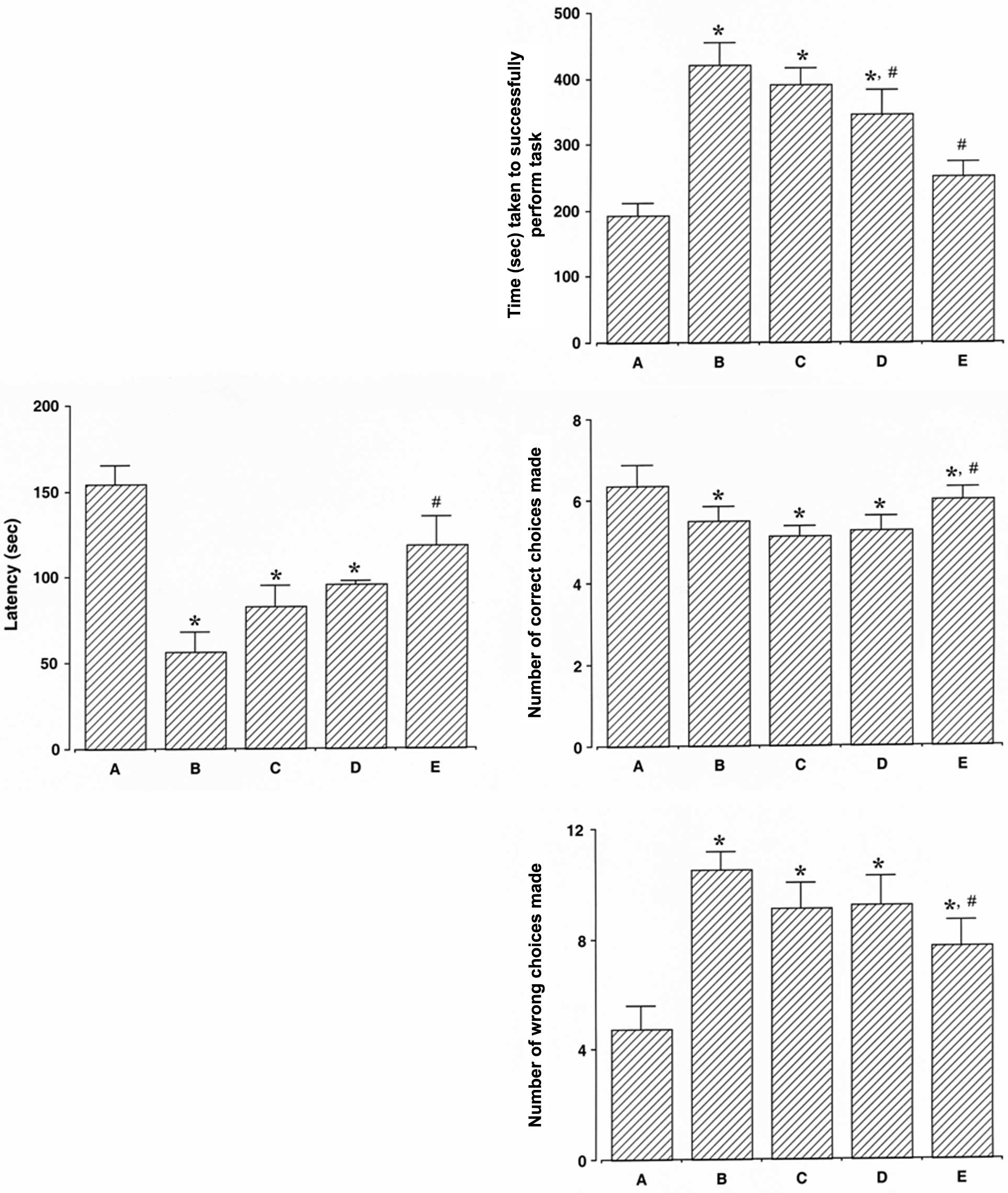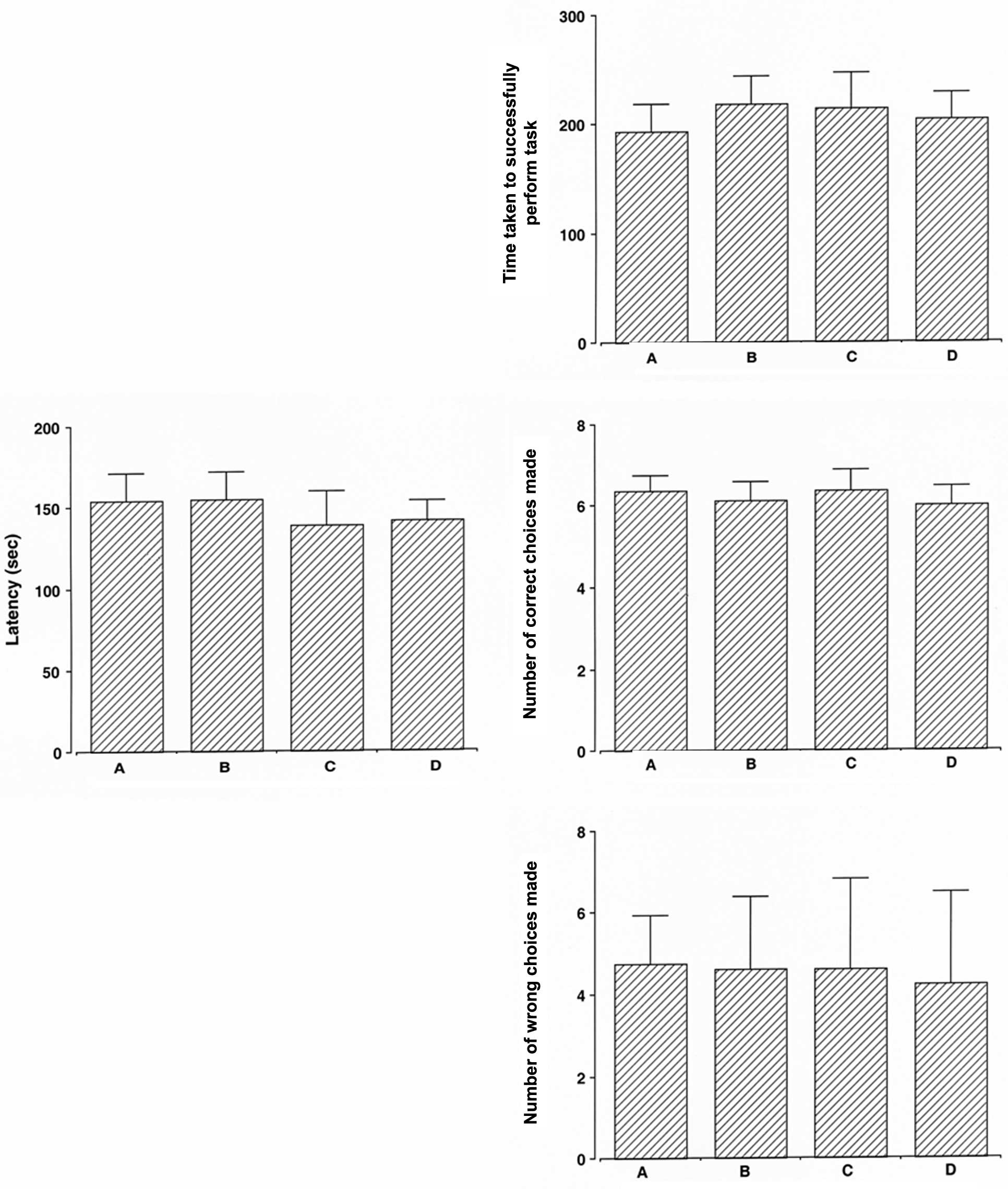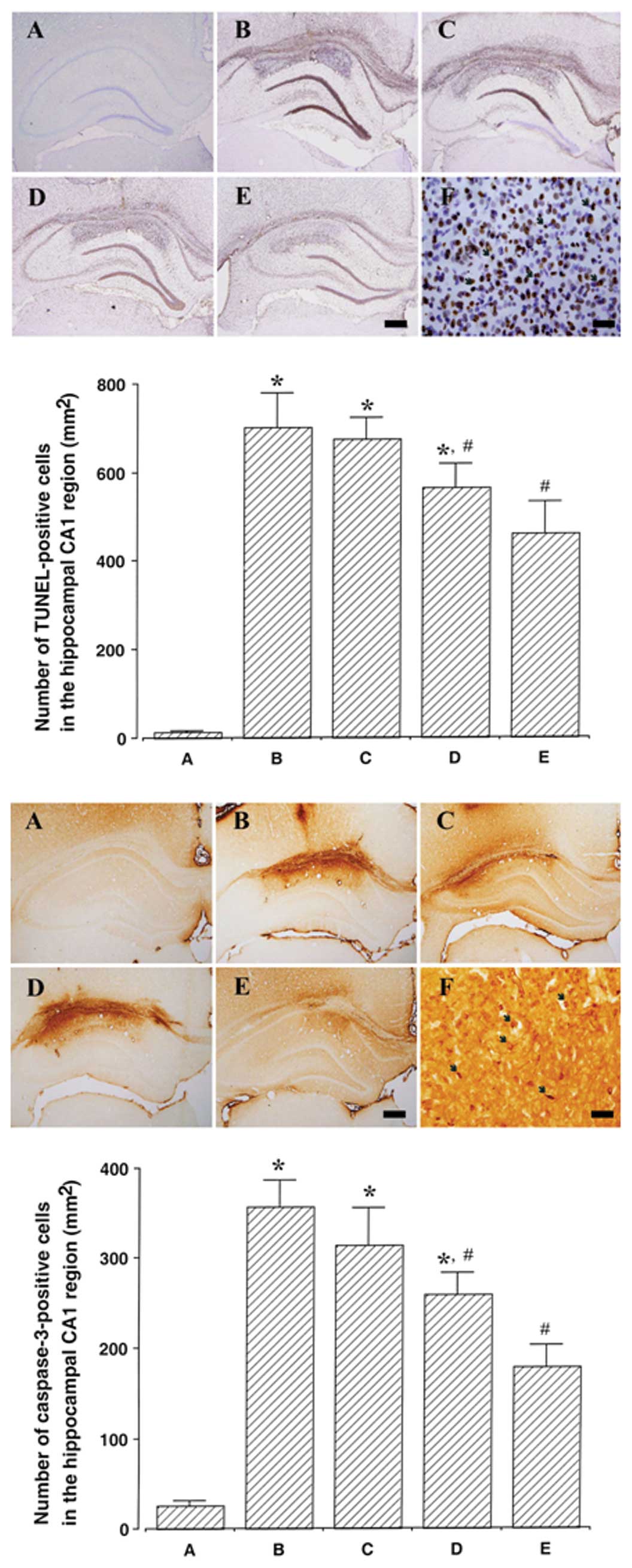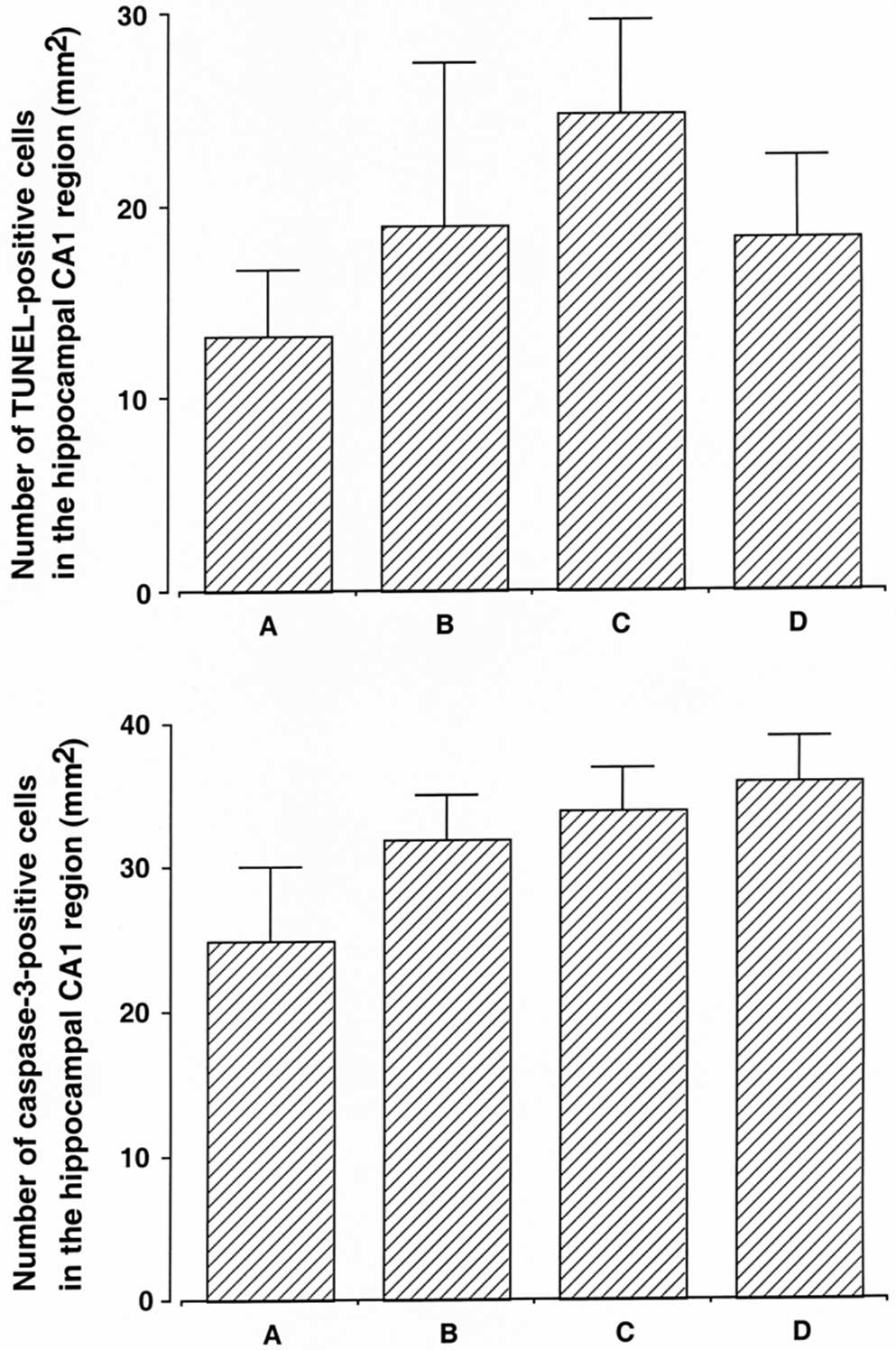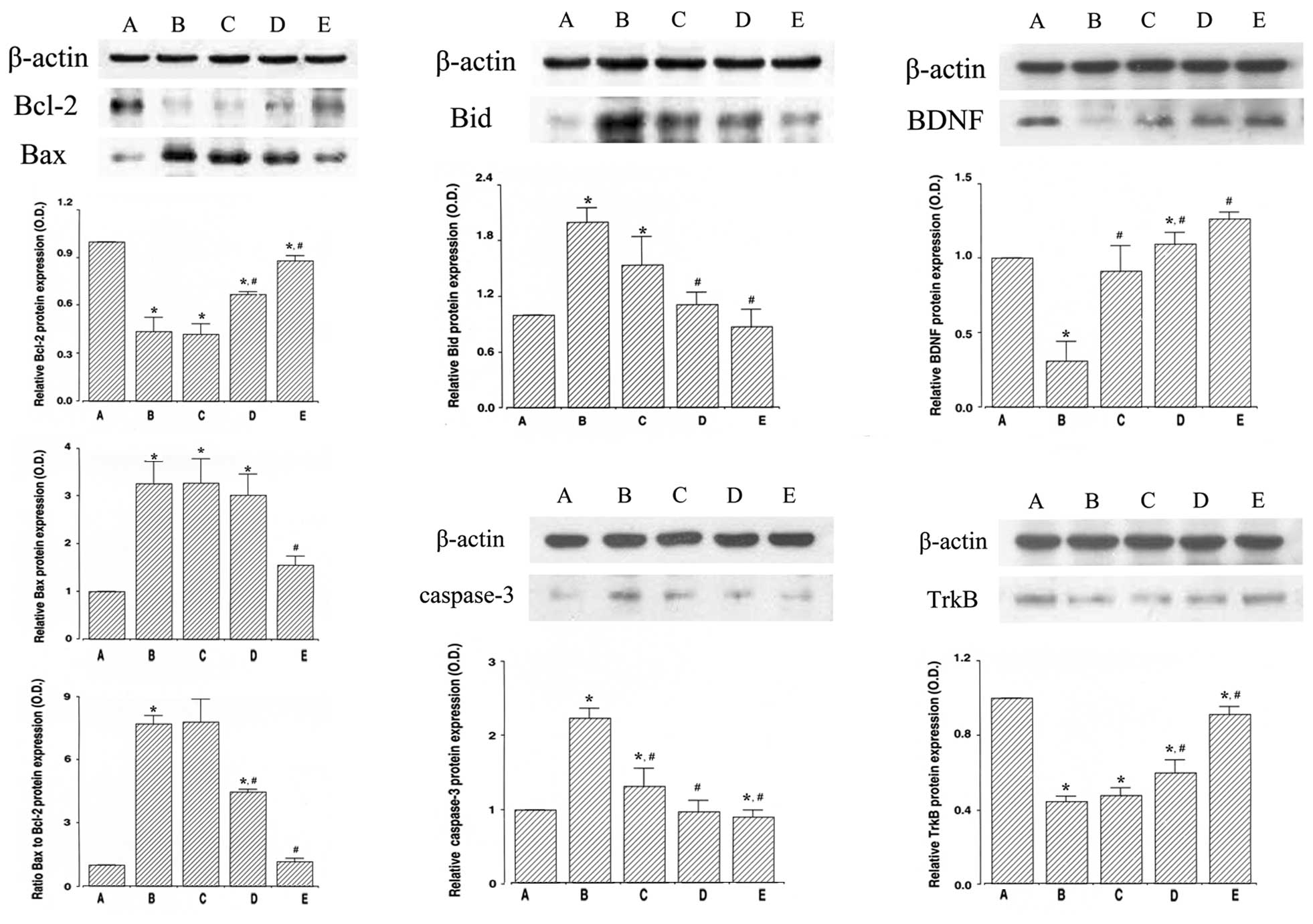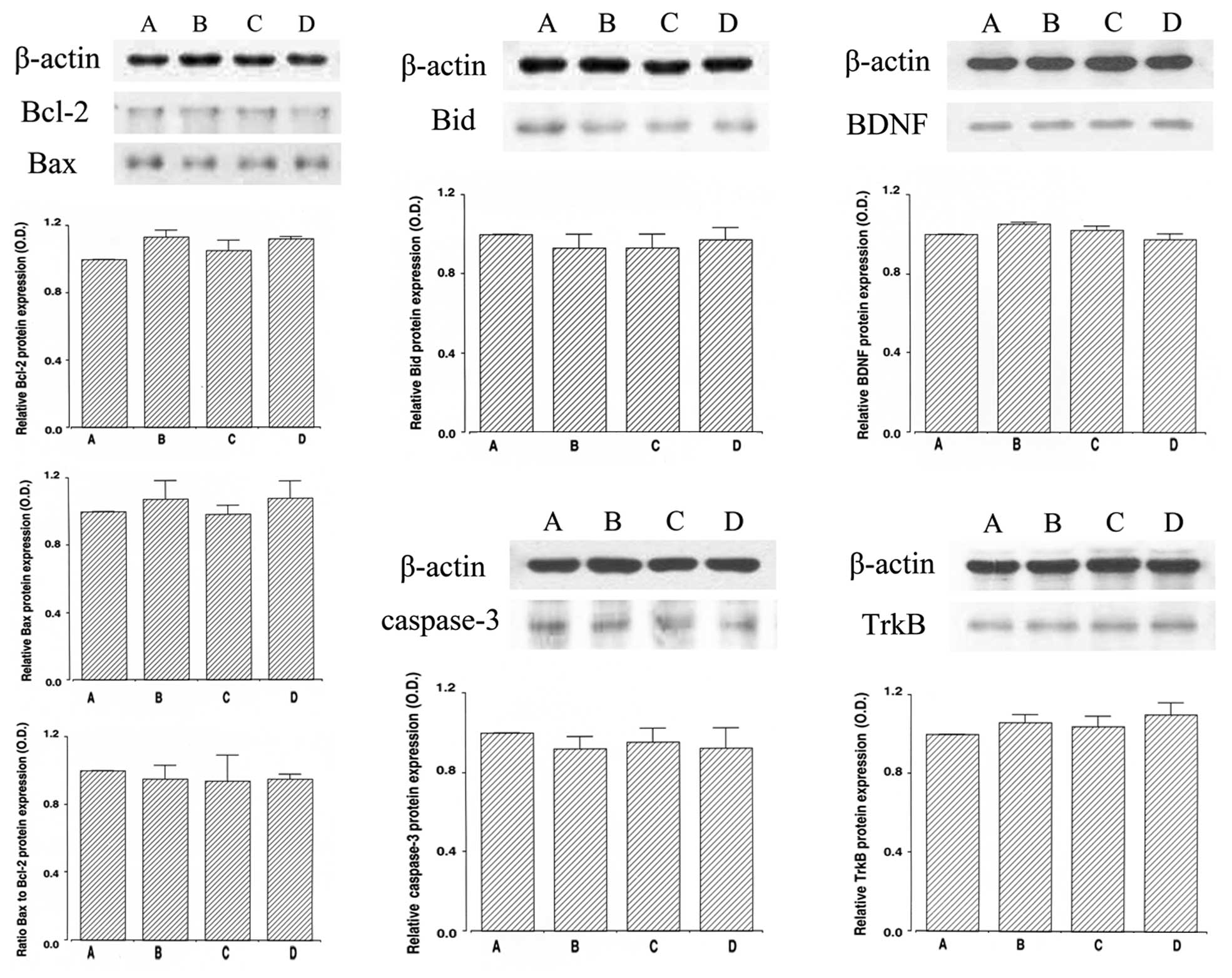|
1
|
Ferro JM: Update on intracerebral
haemorrhage. J Neurol. 253:985–999. 2006. View Article : Google Scholar : PubMed/NCBI
|
|
2
|
Lee HH, Kim H, Lee MH, Chang HK, Lee TH,
Jang MH, Shin MC, Lim BV, Shin MS, Kim YP, Yoon JH, Jeong IG and
Kim CJ: Treadmill exercise decreases intrastriatal
hemorrhage-induced neuronal cell death via suppression on caspase-3
expression in rats. Neurosci Lett. 352:33–36. 2003. View Article : Google Scholar : PubMed/NCBI
|
|
3
|
Suh HJ, So SM, Na YG, Ko IG, Kim SE, Sung
YS, Shin MS, Kim CJ, Cho YS and Kim KH: Neuroprotective effects of
tamsulosin on intracerebral hemorrhage. Neural Regen Res.
6:2505–2510. 2011.
|
|
4
|
Thompson CB: Apoptosis in the pathogenesis
and treatment of disease. Science. 267:1456–1462. 1995. View Article : Google Scholar : PubMed/NCBI
|
|
5
|
Johnson EM Jr, Greenlund LJ, Atkins PT and
Hsu CY: Neuronal apoptosis: current understanding of molecular
mechanisms and potential role in ischemic brain injury. J
Neurotrauma. 12:843–852. 1995. View Article : Google Scholar : PubMed/NCBI
|
|
6
|
Reed CJ: Apoptosis and cancer: strategies
for integrating programmed cell death. Semin Hematol. 37(Suppl 7):
9–16. 2000. View Article : Google Scholar : PubMed/NCBI
|
|
7
|
Gong C, Boulis N, Qian J, Turner DE, Hoff
JT and Keep RF: Intracerebral hemorrhage-induced neuronal death.
Neurosurgery. 48:875–882. 2001.PubMed/NCBI
|
|
8
|
Upadhyay D, Panduri V, Ghio A and Kamp DW:
Particulate matter induces alveolar epithelial cell DNA damage and
apoptosis: role of free radicals and the mitochondria. Am J Respir
Cell Mol Biol. 29:180–187. 2003. View Article : Google Scholar : PubMed/NCBI
|
|
9
|
Gomez-Pinilla F and Vaynman S: A
‘deficient environment’ in prenatal life may compromise systems
important for cognitive function by affecting BDNF in the
hippocampus. Exp Neurol. 192:235–243. 2005.
|
|
10
|
Minichiello L: TrkB signalling pathways in
LTP and learning. Nat Rev Neurosci. 10:850–860. 2009. View Article : Google Scholar : PubMed/NCBI
|
|
11
|
Zimmerberg B, Foote HE and Van Kempen TA:
Olfactory association learning and brain-derived neurotrophic
factor in an animal model of early deprivation. Dev Psychobiol.
51:333–344. 2009. View Article : Google Scholar : PubMed/NCBI
|
|
12
|
Hasegawa Y, Suzuki H, Altay O and Zhang
JH: Preservation of tropomyosin-related kinase B (TrkB) signaling
by sodium orthovanadate attenuates early brain injury after
subarachnoid hemorrhage in rats. Stroke. 42:477–483. 2011.
View Article : Google Scholar
|
|
13
|
Ard J, Doyle W and Bekker A: Awake
craniotomy with dexmedetomidine in pediatric patients. J Neurosurg
Anesthesiol. 15:263–266. 2003. View Article : Google Scholar : PubMed/NCBI
|
|
14
|
Ramsay MA and Luterman DL: Dexmedetomidine
as a total intravenous anesthetic agent. Anesthesiology.
101:787–790. 2004. View Article : Google Scholar : PubMed/NCBI
|
|
15
|
Dahmani S, Rouelle D, Gressens P and Mantz
J: Effects of dexmedetomidine on hippocampal focal adhesion kinase
tyrosine phosphorylation in physiologic and ischemic conditions.
Anesthesiology. 103:969–977. 2005. View Article : Google Scholar : PubMed/NCBI
|
|
16
|
Laudenbach V, Mantz J, Lagercrantz H,
Desmonts JM, Evrard P and Gressens P: Effects of
α2-adrenoceptor agonists on perinatal excitotoxic brain
injury: comparison of clonidine and dexmedetomidine.
Anesthesiology. 96:134–141. 2002.
|
|
17
|
Ma D, Hossain M, Rajakumaraswamy N, Arshad
M, Sanders RD, Franks NP and Maze M: Dexmedetomidine produces its
neuroprotective effect via the α2A-adrenoceptor subtype.
Eur J Pharmacol. 502:87–97. 2004.PubMed/NCBI
|
|
18
|
Eser O, Fidan H, Sahin O, Cosar M, Yaman
M, Mollaoglu H, Songur A and Buyukbas S: The influence of
dexmedetomidine on ischemic rat hippocampus. Brain Res.
1218:250–256. 2008. View Article : Google Scholar : PubMed/NCBI
|
|
19
|
Cosar M, Eser O, Fidan H, Sahin O,
Buyukbas S, Ela Y, Yagmurca M and Ozen OA: The neuroprotective
effect of dexmedetomidine in the hippocampus of rabbits after
subarachnoid hemorrhage. Surg Neurol. 71:54–59. 2009. View Article : Google Scholar
|
|
20
|
Ayoglu H, Gul S, Hanci V, Bahadir B,
Bektas S, Mungan AG, Turan IO and Acikgoz B: The effects of
dexmedetomidine dosage on cerebral vasospasm in a rat subarachnoid
haemorrhage model. J Clin Neurosci. 17:770–773. 2010. View Article : Google Scholar : PubMed/NCBI
|
|
21
|
Hall JE, Uhrich TD, Barney JA, Arain SR
and Ebert TJ: Sedative, amnestic, and analgesic properties of
small-dose dexmedetomidine infusions. Anesth Analg. 90:699–705.
2000. View Article : Google Scholar : PubMed/NCBI
|
|
22
|
Takamatsu I, Iwase A, Ozaki M, Kazama T,
Wada K and Sekiguchi M: Dexmedetomidine reduces long-term
potentiation in mouse hippocampus. Anesthesiology. 108:94–102.
2008. View Article : Google Scholar : PubMed/NCBI
|
|
23
|
van Oostrom H, Stienen PJ, Doornenbal A
and Hellebrekers LJ: The α2-adrenoceptor agonist
dexmedetomidine suppresses memory formation only at doses
attenuating the perception of sensory input. Eur J Pharmacol.
629:58–62. 2010.
|
|
24
|
Hayama HR, Drumheller KM, Mastromonaco M,
Reist C, Cahill LF and Alkire MT: Event-related functional magnetic
resonance imaging of a low dose of dexmedetomidine that impairs
long-term memory. Anesthesiology. 117:981–995. 2012. View Article : Google Scholar : PubMed/NCBI
|
|
25
|
Ko IG, Shin MS, Kim BK, Kim SE, Sung YH,
Kim TS, Shin MC, Cho HJ, Kim SC, Kim SH, Kim KH, Shin DH and Kim
CJ: Tadalafil improves short-term memory by suppressing
ischemia-induced apoptosis of hippocampal neuronal cells in
gerbils. Pharmacol Biochem Behav. 91:629–635. 2009. View Article : Google Scholar : PubMed/NCBI
|
|
26
|
Kim SE, Ko IG, Kim BK, Shin MS, Cho S, Kim
CJ, Kim SH, Baek SS, Lee EK and Jee YS: Treadmill exercise prevents
aging-induced failure of memory through an increase in neurogenesis
and suppression of apoptosis in rat hippocampus. Exp Gerontol.
45:357–365. 2010. View Article : Google Scholar : PubMed/NCBI
|
|
27
|
Nys GM, van Zandvoort MJ, de Kort PL,
Jansen BP, de Haan EH and Kappelle LJ: Cognitive disorders in acute
stroke: prevalence and clinical determinants. Cerebrovasc Dis.
23:408–416. 2007. View Article : Google Scholar : PubMed/NCBI
|
|
28
|
Su CY, Chen HM, Kwan AL, Lin YH and Guo
NW: Neuro-psychological impairment after hemorrhagic stroke in
basal ganglia. Arch Clin Neuropsychol. 22:465–474. 2007. View Article : Google Scholar : PubMed/NCBI
|
|
29
|
Ko IG, Cho H, Kim SE, Kim JE, Sung YH, Kim
BK, Shin MS, Cho S, Pak YK and Kim CJ: Hypothermia alleviates
hypoxic ischemia-induced dopamine dysfunction and memory impairment
in rats. Anim Cells Syst. 15:279–286. 2011. View Article : Google Scholar
|
|
30
|
Baek SS, Jun TW, Kim KJ, Shin MS, Kang SY
and Kim CJ: Effects of postnatal treadmill exercise on apoptotic
neuronal cell death and cell proliferation of maternal-separated
rat pups. Brain Dev. 34:45–56. 2012. View Article : Google Scholar : PubMed/NCBI
|
|
31
|
Matsushita K, Meng W, Wang X, Asahi M,
Asahi K, Moskowitz MA and Lo EH: Evidence for apoptosis after
intercerebral hemorrhage in rat striatum. J Cereb Blood Flow Metab.
20:396–404. 2000. View Article : Google Scholar : PubMed/NCBI
|
|
32
|
Qureshi AI: Nonsteroidal anti-inflammatory
drugs and the risk of intracerebral hemorrhage. Stroke. 34:379–386.
2003.PubMed/NCBI
|
|
33
|
Benchoua A, Braudeau J, Reis A, Couriaud C
and Onténiente B: Activation of proinflammatory caspases by
cathepsin B in focal cerebral ischemia. J Cereb Blood Flow Metab.
24:1272–1279. 2004. View Article : Google Scholar : PubMed/NCBI
|
|
34
|
Plesnila N, Zinkel S, Amin-Hanjani S, Qiu
J, Korsmeyer SJ and Moskowitz MA: Function of BID - a molecule of
the bcl-2 family - in ischemic cell death in the brain. Eur Surg
Res. 34:37–41. 2002. View Article : Google Scholar : PubMed/NCBI
|
|
35
|
Niizuma K, Endo H, Nito C, Myer DJ, Kim GS
and Chan PH: The PIDDosome mediates delayed death of hippocampal
CA1 neurons after transient global cerebral ischemia in rats. Proc
Natl Acad Sci USA. 105:16368–16373. 2008. View Article : Google Scholar : PubMed/NCBI
|
|
36
|
Sugawara T, Fujimura M, Noshita N, Kim GW,
Saito A, Hayashi T, Narasimhan P, Maier CM and Chan PH: Neuronal
death/survival signaling pathways in cerebral ischemia. NeuroRx.
1:17–25. 2004. View Article : Google Scholar : PubMed/NCBI
|
|
37
|
Kuwana T and Newmeyer DD: Bcl-2-family
proteins and the role of mitochondria in apoptosis. Curr Opin Cell
Biol. 15:691–699. 2003. View Article : Google Scholar : PubMed/NCBI
|
|
38
|
Engelhard K, Werner C, Eberspächer E,
Bachl M, Blobner M, Hildt E, Hutzler P and Kochs E: The effect of
the α2-agonist dexmedetomidine and the
N-methyl-D-aspartate antagonist S(+)-ketamine on the expression of
apoptosis-regulating proteins after incomplete cerebral ischemia
and reperfusion in rats. Anesth Analg. 96:524–531. 2003.
|
|
39
|
Il'inykh FA, Bannova AV, Kalinina TS and
Dygalo NN: Effects of ligands of α2-adrenoceptors on
mRNA level of apoptotic proteins in the developing rat brain. Izv
Akad Nauk Ser Biol. 1:104–109. 2008.(In Russian).
|
|
40
|
Sanders RD, Sun P, Patel S, Li M, Maze M
and Ma D: Dexmedetomidine provides cortical neuroprotection: impact
on anaesthetic-induced neuroapoptosis in the rat developing brain.
Acta Anaesthesiol Scand. 54:710–716. 2010. View Article : Google Scholar : PubMed/NCBI
|
|
41
|
Xu B, Gottschalk W, Chow A, Wilson RI,
Schnell E, Zang K, Wang D, Nicoll RA, Lu B and Reichardt LF: The
role of brain-derived neurotrophic factor receptors in the mature
hippocampus: modulation of long-term potentiation through a
presynaptic mechanism involving TrkB. J Neurosci. 20:6888–6897.
2000.
|
|
42
|
Pang PT, Teng HK, Zaitsev E, Woo NT,
Sakata K, Zhen S, Teng KK, Yung WH, Hempstead BL and Lu B: Cleavage
of proBDNF by tPA/plasmin is essential for long-term hippocampal
plasticity. Science. 306:487–491. 2004. View Article : Google Scholar : PubMed/NCBI
|
|
43
|
Hellmich HL, Garcia JM, Shimamura M, Shah
SA, Avila MA, Uchida T, Parsley MA, Capra BA, Eidson KA, Kennedy
DR, Winston JH, DeWitt DS and Prough DS: Traumatic brain injury and
hemorrhagic hypotension suppress neuroprotective gene expression in
injured hippocampal neurons. Anesthesiology. 102:806–814. 2005.
View Article : Google Scholar
|
|
44
|
Sairanen M, Lucas G, Ernfors P, Castrén M
and Castrén E: Brain-derived neurotrophic factor and antidepressant
drugs have different but coordinated effects on neuronal turnover,
proliferation, and survival in the adult dentate gyrus. J Neurosci.
25:1089–1094. 2005. View Article : Google Scholar
|
|
45
|
Suzuki A, Fukushima H, Mukawa T, Toyoda H,
Wu LJ, Zhao MG, Xu H, Shang Y, Endoh K, Iwamoto T, Mamiya N, Okano
E, Hasegawa S, Mercaldo V, Zhang Y, Maeda R, Ohta M, Josselyn SA,
Zhuo M and Kida S: Upregulation of CREB-mediated transcription
enhances both short- and long-term memory. J Neurosci.
31:8786–8802. 2011. View Article : Google Scholar : PubMed/NCBI
|
|
46
|
Han QQ, Jin W, Xiao ZF, Huang JC, Ni HB,
Kong J, Wu J, Chen B, Liang WB and Dai JW: The promotion of
neurological recovery in an intracerebral hemorrhage model using
fibrin-binding brain derived neurotrophic factor. Biomaterials.
32:3244–3252. 2011. View Article : Google Scholar
|















